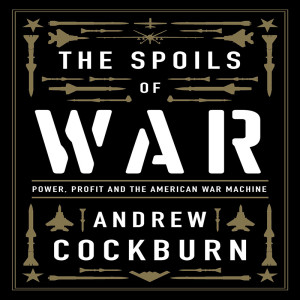
Parallax Views w/ J.G. Michael
Society & Culture

The Spoils of War: Power, Profit, & the American War Machine w/ Andrew Cockburn/U.S.-Russia Tensions, Ukraine, & Strategic Empathy w/ Nicolai Petro
 2022-01-28
2022-01-28
On this edition of Parallax Views, Andrew Cockburn, Washington, D.C., editor of Harper's Magazine, joins us to discuss his book The Spoils of War: Power, Profit, and the American War Machine. Cockburn argues that talk of "foreign policy", "defense", and even Left criticisms concerning imperialism and Empire camouflage the true nature of the military-industrial complex: keeping the money flow going. In other word, making profits. Andrew and I discuss a number of issues including the military-industrial complex as something akin to a "living, insatiable, creature" or amoeba "dedicated only to its own defense and power", the question of ideology and idealogues as it relates to the American war machine, Bill Clinton and NATO expansion after the Cold War, threat inflation, the absence of long-term peace dividends when wars end, the rise of the neoconservatives, Russiagate, profits of war outside of U.S. actors (military-industrial complexes in other countries), the so-called missile gap of the Cold War era, hypersonic weapons, the human cost of the war machine (Cockburn discusses the Korean War in this regard), and much, much more!
Then, in the second half of the program Nicolai Petro, Silvia-Chandley Professor of Peace Studies and Nonviolence and Professor of Political Science at the University of Rhode Island and the US State Department's special assistant for policy on the Soviet Union under President George HW Bush, stops by for a discussion about U.S.-Russia tensions, Ukranian nationalism, and the need for strategic empathy in foreign policy. Nicolai explains the roots of the Russia/Ukraine crisis going back to 2013 as well as telling us a little bit about the history of Ukranian nationalism, his thoughts on the Azov Battalion, and related matters. We then shift focus slightly to discuss the value of the 20th century diplomat Hans Morgenthau in these times of tension. In this regard we talk about the problem of strategic narcissism and the need for strategic empathy. Are we reading Russia right? How can we read Russia and Putin better? What are the primary problems with the discourse around Russia/Ukraine tensions, NATO, and the U.S. today? Hopefully this conversation will shed light on the answers to some of those questions.
More Episodes
Create your
podcast in
minutes
- Full-featured podcast site
- Unlimited storage and bandwidth
- Comprehensive podcast stats
- Distribute to Apple Podcasts, Spotify, and more
- Make money with your podcast
It is Free
- Privacy Policy
- Cookie Policy
- Terms of Use
- Consent Preferences
- Copyright © 2015-2024 Podbean.com





